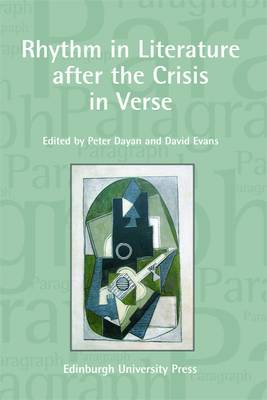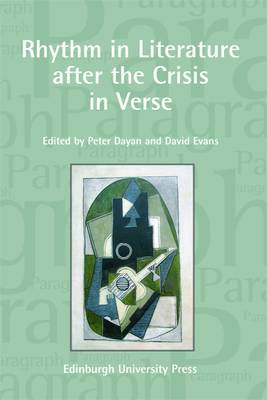
- Retrait gratuit dans votre magasin Club
- 7.000.000 titres dans notre catalogue
- Payer en toute sécurité
- Toujours un magasin près de chez vous
- Retrait gratuit dans votre magasin Club
- 7.000.0000 titres dans notre catalogue
- Payer en toute sécurité
- Toujours un magasin près de chez vous
Rhythm in Literature After the Crisis in Verse
Paragraph Volume 33, Number 2
37,45 €
+ 74 points
Description
Shout lineTraces rhythm in literature in the analysable patterns of metrical verse as it unfolds in the work of post-crisis writersBefore the 'crise de vers' which Mallarmé diagnosed in the 1880s, just as rhythm in music had to do with note values and repeated patterns, so rhythm in literature could be safely sought in the analysable patterns of metrical verse. The crisis abolished that security yet the conviction that rhythm is fundamental to literature survived that destruction. Tracing rhythm as it unfolds in the work of post-crisis writers from Valéry, Woolf, Campana, and the Dadaists, via the strange history of Russian verse under Communism, to Réda, Cortázar, and John Wilkinson, this volume seeks to found such a theory precisely in the space between rhythm's elusiveness as a general concept, and the continuing specific force of its presence in the works of literature.Before the 'crise de vers' which Mallarmé diagnosed in the 1880s, just as rhythm in music had to do with note values and repeated patterns, so rhythm in literature could be safely sought in the analysable patterns of metrical verse. The crisis abolished that security: free verse and prose poetry destroyed the privilege of the old countable rhythms. Yet the conviction that rhythm is fundamental to literature survived that destruction. How? Why? Is there really anything one can say, any theory that can measure up to rhythm since the crisis, to a rhythm that cannot be localised in measurable convention? Tracing rhythm as it unfolds in the work of post-crisis writers from Valéry, Woolf, Campana, and the Dadaists, via the strange history of Russian verse under Communism, to Réda, Cortázar, and John Wilkinson, this volume seeks to found such a theory precisely in the space between rhythm's elusiveness as a general concept, and the continuing specific force of its presence in the works of literature.
Spécifications
Parties prenantes
- Editeur:
Contenu
- Nombre de pages :
- 128
- Langue:
- Anglais
- Collection :
Caractéristiques
- EAN:
- 9780748640645
- Date de parution :
- 15-07-10
- Format:
- Livre broché
- Format numérique:
- Trade paperback (VS)
- Dimensions :
- 156 mm x 234 mm
- Poids :
- 269 g

Les avis
Nous publions uniquement les avis qui respectent les conditions requises. Consultez nos conditions pour les avis.





